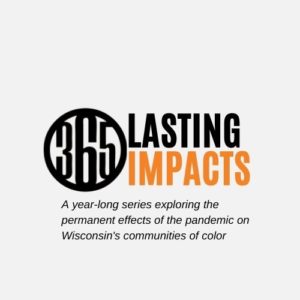
 Collaboration will be the key to picking up the pieces after the COVID-19 pandemic.
Collaboration will be the key to picking up the pieces after the COVID-19 pandemic.
That’s one of several takeaways from a “Lasting Impacts Town Hall,” hosted by Madison365 publisher and CEO Henry Sanders and focusing on Milwaukee-area leaders.
Panelists included Milwaukee County Executive David Crowely, Business Council Executive Director Marjorie Rucker and Hmong Wisconsin Chamber of Commerce CEO Maysee Her.
The immediate response to the pandemic itself required unprecedented levels of collaboration, especially in Milwaukee County, Crowley said.
“We’re the largest and most diverse county in the state of Wisconsin. But being the most diverse and largest county comes with some caveats, because we’re also the only county in the state of Wisconsin that does not have a county wide health department,” he said. “We had to work with 19 different municipalities, 11 different health departments on the onset of the COVID-19 pandemic. We created a unified Emergency Operations Center. There was a lot of politics that got involved in how we make decisions based on different municipalities … but I will say that it forced many places to come together and have a conversation. It forced Milwaukee County to have this conversation.
“I’ve learned to compromise,” Crowley added. “And when I say compromise … compromise isn’t necessarily saying that I’m going to give up something to get to a specific place, it’s really having an understanding of why people are making certain decisions on where they are.”
The aftermath also required – and will continue to require – collaborative efforts, the panelists said, especially when it comes to rebuilding the workforce.
“I think the pandemic has really exacerbated what we were seeing pre COVID,” Crowley said, noting that the so-called “gig economy” had already changed people’s relationship to work. “We just have to think about things differently. We all have antiquated ways. So when it comes down to finding new workers, we’re looking for the perfect candidate versus looking for the perfect capable candidate … all of us are gonna have to come to the table and really hunker down. Workforce development is going to be one of the key factors. And not just workforce development, but how that ties into housing and transportation. Because that’s another key issue when it comes down to employing and retaining talent, making sure that they’re in a safe neighborhood, making sure they got the some of the best and brightest school districts, but more importantly, how are we investing in a quality of life, particularly for local governments who may be struggling because of this pandemic?”
Rucker concurred, saying that leaders and institutions should “really start working together to make sure that we’re working holistically, it’s great to solve housing, it’s great to solve workforce, it’s great to build new businesses, it’s great to cure homelessness, but all of those things touch each other, it’s a circle.”
Crowley said Milwaukee as a community came through the pandemic largely because “we really got out of our silos, we’re really focused on cross sector collaboration.”
“We’re more resilient than we think we are,” Rucker said. “We need each other. We’re better together. No matter what walk of life we’ve come from, we’re stronger together.”
Businesses prove resilient
Rucker noted that as many as 40 percent of businesses owned by people of color nationwide closed permanently during the pandemic. Rucker and Her both said the crisis exposed the fact that many businesses owned by people of color lack access to financial resources and advice required to navigate big changes.
Still, Her said many Wisconsin businesses were able to adapt and pivot – especially when they sought support.
“I would say the resilience of many of these businesses just was a very pleasant surprise. Actually very few that we work with closed permanently,” Her said.
In fact, Her said, the pandemic sparked an uptick in entrepreneurship.
“It’s amazing how many individuals decided this was a good time to consider opening a new business, or changing it up a little bit,” she said. “We’ve seen many folks who’ve come to us for business assistance, or just some advice on how to start a business.”
The Lasting Impacts Town Hall series featured discussions with leaders from Madison, Milwaukee and the Fox Valley, as well as a panel discussion on the lasting impacts of the pandemic in health equity as part of the fifth annual Wisconsin Leadership Summit.
The best way to protect yourself and your community from COVID-19 is to get vaccinated and stay current on boosters. Click here for more infomation.



